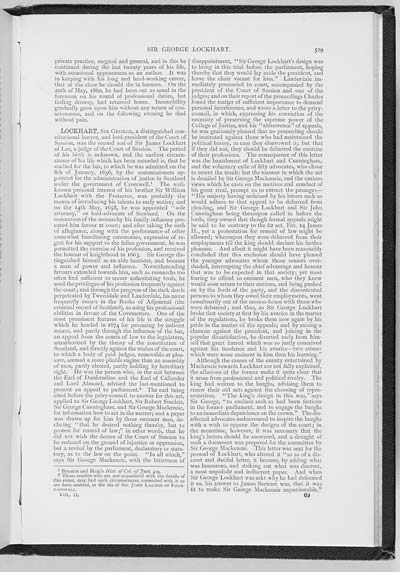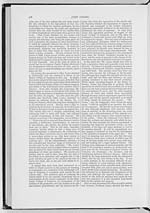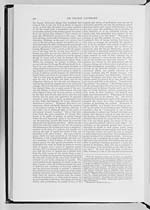Volume 2 > Half-Volume 4
(285) Page 529 - Lockhart, Sir George
Download files
Individual page:
Thumbnail gallery: Grid view | List view

529 private practice, surgical and general, and in this he continued during the last twenty years of his life, with occasional appearances as an author. It was in keeping with his long and hard-working career, that at the close he should die in harness. On the 20th of May, 1860, he had been out as usual in the forenoon on his round of professional duties, but feeling drowsy, had returned home. Insensibility gradually grew upon him without any return of con- sciousness, and on the following evening he died without pain. LOCKHART, SIR GEORGE, a distinguished con- stitutional lawyer, and lord-president of the Court of Session, was the second son of Sir James Lockhart of Lee, a judge of the Court of Session. The period of his birth is unknown, and the earliest circum- stance of his life which has been recorded is, that he studied for the bar, to which he was admitted on the 8th of January, 1656, by the commissioners ap- pointed for the administration of justice in Scotland under the government of Cromwell.1 The well- known personal interest of his brother Sir William Lockhart with the Protector, was probably the means of introducing his talents to early notice; and on the I4th May, 1658, he was appointed "sole attorney," or lord-advocate of Scotland. On the restoration of the monarchy his family influence pro- cured him favour at court; and after taking the oath of allegiance, along with the performance of other somewhat humiliating ceremonies, expressive of re- gret for his support to the fallen government, he was permitted the exercise of his profession, and received the honour of knighthood in 1663. Sir George dis- tinguished himself as an able barrister, and became a man of power and influence. Notwithstanding favours extended towards him, such as monarchs too often find sufficient to secure unhesitating tools, he used the privileges of his profession frequently against the court; and through the progress of the dark deeds perpetrated by Tweeddale and Lauderdale, his name frequently occurs in the Books of Adjournal (the criminal record of Scotland), as using his professional abilities in favour of the Covenanters. One of the most prominent features of his life is the struggle which he headed in 1674 for procuring by indirect means, and partly through the influence of the bar, an appeal from the courts of law to the legislature, unauthorized by the theory of the constitution of Scotland, and directly against the wishes of the court, to which a body of paid judges, removable at plea- sure, seemed a more pliable engine than an assembly of men, partly elected, partly holding by hereditary right. He was the person who, in the suit between the Earl of Dunfermline and the Earl of Callender and Lord Almond, advised the last-mentioned to present an appeal to parliament.2 The earl being cited before the privy-council to answer for this act, applied to Sir George Lockhart, Sir Robert Sinclair, Sir George Cunningham, and Sir George Mackenzie, for information how to act in the matter; and a paper was drawn up for him by these eminent men, de- claring "that he desired nothing thereby, but to protest for remeid of law;" in other words, that he did not wish the decree of the Court of Session to be reduced on the ground of injustice or oppression, but a revisal by the parliament, declaratory or statu- tory, as to the law on the point. "In all which," says Sir George Mackenzie, with the bitterness of 1 Brunton and Haig's Hist, of Col. of just. 419. 2 Those readers who are not acquainted with the details of this event, may find such circumstances connected with it as are here omitted, in the life of SIR JOHN LAUDER OF FOUN- TAINHALL. VOL. II. disappointment, "Sir George Lockhart's design was to bring in this trial before the parliament, hoping thereby that they would lay aside the president, and leave the chair vacant for him." Lauderdale im- mediately proceeded to court, accompanied by the president of the Court of Session and one of the judges; and on their report of the proceedings Charles found the matter of sufficient importance to demand personal interference, and wrote a letter to the privy- council, in which, expressing his conviction of the necessity of preserving the supreme power of the College of Justice, and his "abhorrence" of appeals, he was graciously pleased that no proceeding should be instituted against those who had maintained the political heresy, in case they disavowed it; but that if they did not, they should be debarred the exercise of their professions. The consequence of this letter was the banishment of Lockhart and Cunningham, and the voluntary exile of fifty advocates, who chose to resent the insult: but the manner in which the act is detailed by Sir George Mackenzie, and the curious views which he casts on the motives and conduct of his great rival, prompt us to extract the passage:� "His majesty having ordained by his letters such as would adhere to that appeal to be debarred from pleading, and Sir George Lockhart and Sir John Cunningham being thereupon called in before the lords, they owned that though formal appeals might be said to be contrary to the 62 act. Par. 14 James II., yet a protestation for remeid of law might be allowed; whereupon they were debarred from their employments till the king should declare his further pleasure. And albeit it might have been reasonably concluded that this exclusion should have pleased the younger advocates whom those seniors over- shaded, interrupting the chief advantage and honour that was to be expected in that society; yet most fearing to offend so eminent men, who they knew would soon return to their stations, and being pushed on by the lords of the party, and the discontented persons to whom they owed their employments, went tumultuarily out of the session-house with those who were debarred; and thus, as Sir George Lockhart broke that society at first by his avarice in the matter of the regulations, he broke them now again by his pride in the matter of the appeals; and by raising a clamour against the president, and joining in the popular dissatisfaction, he diverted early from him- self that great hatred which was so justly conceived against his insolence and his avarice�two crimes which were more eminent in him than his learning." Although the causes of the enmity entertained by Mackenzie towards Lockhart are not fully explained, the allusions of the former make it quite clear that it arose from professional and political rivalry. The king had written to the burghs, advising them to renew their old acts against the choosing of repre- sentatives. "The king's design in this was," says Sir George, " to exclude such as had been factious in the former parliament, and to engage the burghs to an immediate dependence on the crown." The dis- affected advocates endeavoured to inspire the burghs with a wish to oppose the designs of the court; in the meantime, however, it was necessary that the king's letters should be answered, and a draught of such a document was prepared for the committee by Sir George Mackenzie. This letter was sent for the perusal of Lockhart, who altered it "so as of a dis- creet and dutiful letter, it became, by adding what was humorous, and striking out what was discreet, a most unpolisht and indiscreet paper. And when Sir George Lockhart was askt why he had deformed it so, his answer to James Stewart was, that it was fit to make Sir George Mackenzie unpardonable." 69
Set display mode to:
![]() Universal Viewer |
Universal Viewer | ![]() Mirador |
Large image | Transcription
Mirador |
Large image | Transcription
Images and transcriptions on this page, including medium image downloads, may be used under the Creative Commons Attribution 4.0 International Licence unless otherwise stated. ![]()
| Biographical dictionary of eminent Scotsmen > Volume 2 > Half-Volume 4 > (285) Page 529 - Lockhart, Sir George |
|---|
| Description | Spine title: Half-Vol. IV. Heriot to Lynedoch. |
|---|---|
| Description | Volume II. Contains names alphabetically from Falconer to Lynedoch. |
|---|

